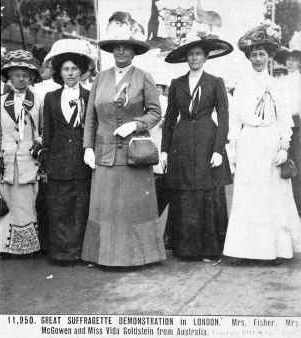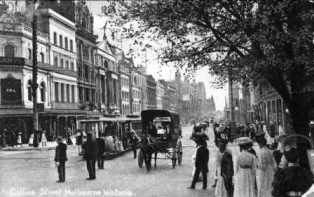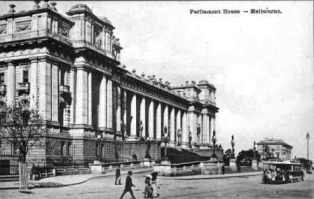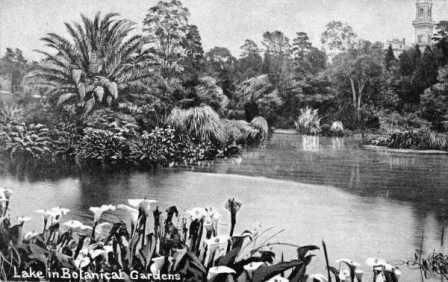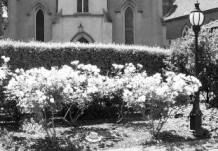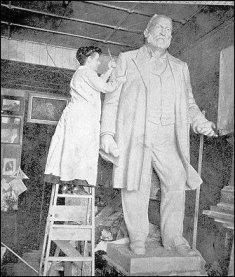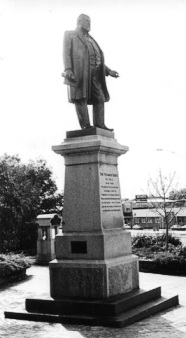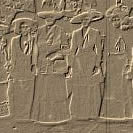 |
WOMEN WORKING TOGETHER |
THIS SITE CONTAINS
1 to 5 - Winning the vote
Chapter 1: The Vote or Bust 1788-1908
Chapter 2: Who Were the Suffragists?Chapter 3: 'United and Representative Agitation'
Chapter 4: Anti-Suffragists 1900-1910Chapter 5: Onwards to Success 1884-1908
6 to 10 - Social Justice and peace
Chapter 6: Moving into the Public World
Chapter 7: 1914-18 War - Pro Peace, Pro and Anti War
Chapter 8: Women's Work in WW1
Chapter 9: 1919-1935 - Surviving
Chapter 10: 1935-1945 Still Surviving
11 to 15 - Finding our voice as women
Chapter 11: 1945 and after - In Our Own Right
Chapter 12: 1970's Protesting - Working Together Again
Chapter 13: Finding Our Voice - Women's Liberation
Chapter 14: Working Collectively
Chapter 15: The 1970's & 80's Broader Women's Movement
16 to 20 - Our legacy our strength our struggle
Chapter 16: In Our Own Hands - Our Bodies
Chapter 17: Whose Right to Choose?- Our Selves
Chapter 18: Environment Matters
Chapter 19: 1990's When the Women's Movement is Quiet
Chapter 20: What a Legacy We Inherit!
Appendix 1: Papers and Interviews
Appendix 2: Songs from the Women's Movement
WOMEN FROM THE
WOMEN'S MOVEMENT
MENTIONED IN THIS WORK.
Abigail Adams
Ada Brougham
Adela Pankhurst
Adrian Howe
Agnes Murphy
Aileen Goldstein
Ailsa O'Connor
Alayne Park
Alex Butler
Alice B Toklas
Alice Henry
Alice Moon
Alice Suter
Alice Walker
Alice Weekes
Alina Holgate
Alisa Burns
Alison Alexander
Alison Dickie
Alison Richards
Alix McDonald
Alma Morton
Alma Thorpe
Andrea Coote
Annie McKenzie
Alva Geike
Amanda Bede
Amanda Biles
Amanda Graham
Amelia Ceranas
Amelia Lambrick
Amira Ingliss
Amy Castilla
Angelina Austin
Angelina Wonga
Ann Jackson
Anna Brennan
Anna Howie
Anna Morgan
Anna Pha
Anna Shaw
Anna Stewart
Anne Barker
Anne Carson
Anne Conlon
Anne Gowers
Anne Phelan
Anne Riseborough
Anne Stewart
Anne Summers
Annette Bear-Crawford
Annie Lister
Annie Lowe
Annie McKenzie
Anthea Hyslop
Antonie Stolle
Ariel Couchman
Audrey Oldfield
Barb Friday
Barbara Creed
Barbara Hall
Barbara Jones
Barbara Kerr
Barbara Marsh
Barbara Van Meurs
Barbara Wishart
Beatrice Faust
Bella Lavender
Belle McKenzie
Bertha Main
Beryl Carter
Bessie Harrison-Lee
Bessie Rainer Parkes
Bessie Rischbieth
Bette Olle
Betty Richmond
Bev Kingston
Bon Hull
Brettena Smyth
Brienne Callahan
Brigid McCaughey
Bronwyn Pike
Candy Broad
Carmel Shute
Carmen Callil
Carmen Lawrence
Carole Ford
Carole Wilson
Caroline Huidobro
Caroline Landale
Carolyn Allport
Carolyn Jay
Carolyn Worth
Carrie Chapman Catt
Carrie Reed
Caryl Friedman
Cath Mayes
Cath Stone
Catherine Anne Spence
Catherine Blackburn
Catherine McLennan
Cecilia John
Charlotte P Gilman (Stetson)
Cheris Kramarae
Cheryl Griffin
Chris Cathie
Chris Chapman
Chris Sitka
Chris Zsizsman
Christina Frankland
Christina Stead
Christine Haag
Churls Kramarae
Claire Berry
Clara Weekes
Clare Wright
Claudia Wright
Colleen Hartland
Constance Stone
Cynthis Carson
Dale Dowse
Dale Spender
Daphne Gollan
Deb Schnookal
Deborah Jordan
Deborah Wardley
Di Fruin
Di Otto
Di Surgey
Diane Crunden
Diane Kirby
Diane Sonnenberg
Dianne Edwards
Dianne Scott
Dianne Wells
Dimity Reed
Divna Devic
Dominica Whelan
Dora Coates
Doris Blackburn
Doris Challis
Doris McRae
Dorothy Turner
Dr Adrian Howe
Dr Aletta Jacobs
Dr Clara Stone
Dr Clare Isbister
Dr Constance Stone
Dr Helene Stocker
Dr Georgina Sweet
Dr Gwen Fong
Dr Janet Bacon
Dr Jocelynne Scutt
Dr Lyn McKenzie
Dr Marie Stopes
Dr Mary Glowrey
Dr Mary Stone
Dr Tamara McKean
Duggie Silins
Edie Turnevich
Edith Hedger
Edith Morgan
Edith Taylor
Edna Ryan
Eileen Capocchi
Eileen Kampukuta Brown
Eileen Unkari Crombie
Eleanor Dark
Eleanor Harding
Eleanor Hobbs
Eleanor M Moore
Elizabeth Cady Stanton
Elizabeth Coady
Elizabeth Hooke
Elizabeth Jackson
Elizabeth Ramsay-Laye
Elizabeth Reid
Elizabeth Rennick
Elizabeth Wallace
Elizabeth Wheelahan
Elizabeth Windshuttle
Ellen Julia Gould
Ellen Kleimaker
Ellen Ward
Elphinstone Dick
E McAllister
Emily Dobson
Emily Greene Balch
Emily Munyungka Austin
Emily Pankhurst
Emmaline Pankhurst
Emmy Evald
Ethel Barringer
Eugenie Davidson
Eva Eden
Eva Cox
Eva Figes
Eve Fesl
Eve Gray
Evelyn Gough
Evelyn Greig
Farley Kelly
Fiona Colin
Fiona Moorhead
Fleur Finney
Flo Kennedy
Flora Eldershaw
Florence Kelly
Frances Fraser
Frances Kissling
Fraulein Von Heymann
Freda Durham
Freda Gamble
Freda Steinberg
Frida Kahlo
Florence Miller
Gay Harris
Gayle Tierney
Gaylene Sneadon
Geraldine Briggs
Geraldine Robertson
Georgina McEnroe
Germaine Greer
Gertrude Bussey
Gertrude Stein
Gill Alecto
Gillian Waite
Gina Lewis
Gisela Kaplan
Glen Tomasetti
Greta Pearce
Gudren Drewsen
Gwendolen Swinburne
Harriet Taylor Mill
Hazel Donelly
Heather Jeffcoat
Heather Osland
Helen Anderson
Helen Caldicott
Helen Dow
Helen Durham
Helen Palmer
Helen Reddy
Helen Robertson
Helen Shardey
Helen Sexton
Hellen Cooke
Henrietta Dugdale
Henry Handel Richardson
Hetty Gilbert
Ilka Elkemann
Ina Higgins
Irina Dunn
Isabel McCorkindale
Isabella Goldstein
Isabella Martinis
Ivy Makinta Stewart
Jaala Pulford
Jacinta Allen
Jackie Fristacky
Jacqui Katona
Jan Armstrong Cohn
Jan Bassett
Jan Harper
Jan Mercer
Jan Testro
Jane Addams
Jane Alley
Jane Greig
Jane Mullett
Janet Bacon
Janet Bell
Janet Elefmiotis
Janet Lindsay Greig
Janet McCalman
Janet Michie
Janet Strong
Janey Stone
Janice Brownfoot
Janice Munt
Janine Bourke
Janne Reed
Jean Bedford
Jean Daley
Jean Henry
Jean McLean
Jean Melzer
Jean Sims
Jean Taylor
Jean Thompson
Jeanette Fenelon
Jeanette Powell
Jeanette Rankin
Jeni Thornley
Jennifer Clark
Jennifer Feeney
Jennifer Lee
Jennie Baines
Jenny Bacon
Jenny Barwell
Jenny Lee
Jenny Mikakos
Jenny Rimmer
Jenny Tatchell
Jesse Marlow
Jessie Ferguson
Jessie Henderson
Jessie Mcleod
Jessie Street
Jenny Pausaker
Jessie Street
Jessie Taylor
Jill Jolliffe
Jill Parkes
Jill Reichstein
Jill Roe
Jo Ellis
Jo MacLaine-Cross
Jo Phillips
Jo Wainer
Joan Coxsedge
Joan Curlewis
Joan E Basquil
Joan Goodwin
Joan Elkington
Joan King
Joan Kirner
Joan Rosanove
Joan Rowlands
Joanna Rea
Joanne Duncan
Jocelyne Clarke
Joe Dolce
Josephine Butler
Josie Lee
Joy Damousi
Joyce Barry
Joyce Johnson
Joyce Nicholson
Joyce Stevens
Jude Perera
Judi Willis
Judith Smart
Judy Cassar
Judy Morton
Judy Power
Judy Maddigan
Judy Small
Julia Church
Julia So So
Julianne Fogarty
Julie McCrossin
Julie Shiels
Juliette Mitchell
Kamla Bhasin
Karen Bird
Karen Gillespie
Karen Milgram
Karen Overington
Karen Silkwood
Karina Veal
Kate Darian-Smith
Kate Gilmore
Kate Jennings
Kate Miller
Kath Williams
Katherine Mansfield
Katherine Suzannah Prichard
Kathie Gleeson
Kathie Sarachild
Kathleen Fitzpatrick
Kathleen Maltzahn
Kathryn Sutherland
Kathy Gill
Kathy Wilson
Katrina Veal
Kay Daniels
Kaye Darveniza
Kay Hamilton
Kay Hargreaves
Kay Setches
Kaz Cooke
Keitha Carter
Kerry Blundell
Kerryn & Jenny
Kris Wilkinson
Lady Helen Munro-Ferguson
Lariane Fonseca
Laura Daniele
Laura Van Nooten
Laurie Bebbington
Lena McEwan
Lesbia Harford
Lesley Hewitt
Lesley Podesta
Lesley Stern
Lesley Vick
Leslie Cannold
Leslie Henderson
Lexie Methereall
Libby Brook
Libby Minifie
Lilian Alexander
Lilian Wald
Lily D'Ambrosia
Linda Aarchen
Linda Rubenstein
Linn Van Hek
Lisa Neville
Lisa Shuckroon
Liz Beattie
Liz Byrski
Liz Dowling
Liz Taylor
Lois Bryson
Lois Young
Lorri Manning
Louisa Lawson
Louisa Remedios
Louise Asher
Louise Walford
Lorna Scarles
Lucy Kowing Wilton
Lucy Paling
Lydia Becker
Lyla Barnard
Lyn Chambers
Lyn Hovey
Lyn McKenzie
Lynne Kosky
Mabel Drummond
Mandy Paul
Maree Gladwin
Margaret Bevege
Margaret Baskerville
Margaret Geddes
Margaret James
Margaret Mead
Margaret McKenzie
Margaret McLean
Margaret Roadknight
Margaret Thorp
Margaret Tims
Margaret Tucker
Margot Oliver
Maree Gould
Maria Mies
Marian Sawer
Marian Simms
Marian Vickers
Marie Kirk
Marie McInnes
Marie Rowan
Marion Harper
Marilyn Beaumont
Marilyn Hillgrave
Marilyn Lake
Marsha Thomson
Marylin Waring
Marilyn Wise
Marj Oke
Marjorie Barnard
Marjorie Barrett
Marjorie Waters
Mary Astell
Mary Bartlett
Mary Brodney
Mary Crooks
Mary Fullerton
Mary Gilbert
Mary Grant
Mary Killury
Mary Leigh
Mary Merkenich
Mary Murnane
Mary Owen
Mary Page Stone
Mary Rogers
Mary Salce
Mary Wolstonecraft
Mary Wooldridge
Matron Brown
Maxine Morand
May Brodney
May Langbridge
May Scheidt
May Smith
Megan McMurchy
Melanie Hall
Melinda Freyer
Melvina Ingram
Meredith Tax
Mesdames: Wallace; Baines;
Lavender; Webb; Singleton;
Morris; Gardiner; Reynolds,
Reid.
Mesdames Savage and Bella Lavender
Miles Franklin
Millicent Garrett Fawcett
Miss A Hume
Miss Anderson
Miss C H Thomson
Miss Cuthbertson
Miss D McRae
Miss E Goldstein
Miss E Hedger
Miss Effie Smart
Miss E Nesbit
Miss Geraldine Rede
Miss H Bridger
Miss H McGowan
Miss Harriet Newcomb
Miss Hilda Moody
Miss Jane Adams
Miss Janet Michie
Miss Jeanette Rankin
Miss Judd
Miss L Savage
Miss Lawler
Miss Lillian Locke
Miss Lillian Wald
Miss Mary Fullerton
Miss Miriam Geach
Miss Olive Gray
Miss R Smethurst
Miss Rapier
Miss Selina Cooper
Miss Simmons
Miss Wollen
Miss Stoddart
Miss V Bonner
Misses: Lewis; McMahon; Helsby;
Moody; Wise; Pascoe; Stewart;
Goodwin; Grant etc.
Misses: Mulcahy; Delaney; Townsend;
McGrath; Clements; Collins; Triffle; Cohen; McLean
Moira Rayner
Mollie Baine
Mollie Dyer
Molly Hadfield
Monika Wells
Morag Loh
Madame E Lorton Campbel
Mrs Anna B Howie
Mrs Bella Lavender Halloran
Mrs Beresford Jones
Mrs Bochinon
Mrs Brown
Mrs Catherine P Wallace
Mrs Chesterfield
Mrs Crawford
Mrs Crutchfield
Mrs D Irwin
Mrs D Monsbourgh
Mrs D Nankivell
Mrs Dwyer
Mrs E Hampton
Mrs E M Nimmo
Mrs E Pethridge
Mrs E Rothfield
Mrs Elliot
Mrs E W Nicholls
Mrs Emily Jackson
Mrs Evelyn Gough
Mrs F J Nicholls
Mrs F Williams
Mrs Florence Kelly
Mrs Fryer
Mrs Fisher
Mrs G Cameron
Mrs Goldstein (senior)
Mrs H A Dugdale
Mrs Harrard
Mrs Harrison Lee
Mrs Jamieson
Mrs Janet Strong
Mrs Jessie Vasey
Mrs Joan Rosanove
Mrs Josephine Butler
Mrs Kelly
Mrs Langdale
Mrs Laura Howie
Mrs Lister Watson
Mrs Lowe
Mrs Lucy Paling
Mrs M Hartley
Mrs M B Wollaston
Mrs M Mayall
Mrs Mabel Drummond
Mrs Malcolm
Mrs Martin
Mrs Mary Baird
Mrs Maudsley
Mrs M McGowan
Mrs Moody
Mrs Moore
Mrs Nance Wills
Mrs Naylor
Mrs O'Dowd
Mrs P Eden
Mrs Press
Mrs Pymm
Mrs Renwick
Mrs Robertson
Mrs Rosanov
'Mum' Shirl
Mrs Singleton
Mrs Smythe
Mrs Steele
Mrs Strong
Mrs Warren Kerr
Mrs Z Lees
Muriel Heagney
Myra Roper
Nan Chelsworth
Nancy Kessing
Nancye Smith
Narelle Dwyer
Nawal El Saadawi
Nettie Palmer
Nicole Steinke
Nina Bondarenke
Norma Grieve
Olive Gray
Olive Schreiner
Onnie Wilson
Pam Brewster
Pam Roberts
Pamela Branas
Pamela Curr
Pat Freeman
Pat Gowland
Pat Martin
Patricia Filar
Patsy Adam-Smith
Paula Trechler
Pauline Kennedy
Pauline Pickford
Peggy Cullinan
Penny Cooke
Penny Farrer
Penny Ryan
Peta Tait
Petra Munro
Philippa Hawker
Ponch Hawkes
Prof. Jo Wainer
Prof. Margaret Thornton
Rachel Avery
Rachel Hesley
Rae Walker
Raelene Frances
Ramona Koval
Rebecca West
Renate Howe
Renate Klein
Renee Miller
Renee Romeril
Rhoda Bell
Rigmor Berg
Rivka Pile
Roberta Meilleur
Robin Morgan
Robin Royce
Robyn Archer
Robyn Martin
Robyn Rowland
Romawati Senaga
Ros Bowden
Rose Scott
Rosemarie Gillespie
Rosemary Brown
Rosie Ferber
Ruby Rich
Ruby Tuesday
Ruth Bermann
Ruth Crow
Ruth Ford
Ruth Schnookal
Sabine Fernheicher
Sadie Kirsner
Sally Mendes
Sally Wilkins
Sandra Bloodworth
Sandra Onus
Senator Olive Zakharov
Sharon Jones
Sheila Bayard
Sheila Ricci
Sheila Wynn
Shirley Andrews
Shirley Swain
Sister Gladys Sumner
Sister Blake
Sister Brown
Sister Hannah
Sophie Slater
Stephanie Moore
Sue Jackson
Sue Mountford
Sue Pennicuik
Sue Reid
Sue Russell
Susan Anthony
Susan Hawthorne
Susie Grezik
Susy Potter
Suzane Fabian
Sylvia Azzopardi
Sylvia Plath
Sylvie Leber
Sylvie Shaw
Tammy Lobato
Tanya McIntyre
Teresa Magna
Terri Jackson
Terry Carney
Tess Lee-Ack
Tess Maloney
Thelma Fry
Thelma Lees
Thelma Prior
Thelma Solomon
Therese Radic
Theresa Lynch
Tjunmutja Myra Watson
Tjuta Ivy Makinti Stewart
Tracey Gurd
Tricia Caswell
Tricia Szirom
Trish Crick
Trudy Wise
Una Stannard
Val Ogden
Val Osborne
Vandana Shiva
Verity Bergmann
Vweronica Shwarz
Vida Goldstein
Virginia Geddes
Virginia Woolf
Vivien Brophy
Vivienne Binns
Wendy Lovell
Wendy Lowenstein
Wendy Poussard
Win Graham
Winsome McCaughey
Yolana Sutherland
Yosano Akiko
Yvonne Margarula
Yvonne Smith
Zara Wildenaur
Zelda D'Aprano
Zoe PhillipsThis work is copyright.
Please acknowledge the source/sources of anything you use.Every effort has been made to trace the people used on this site. Please contact us if you have any questions or concerns about our use of material.
Website advice:
Jean McConnachie
Editorial advice:
Barbara Hall, also Apsara Sabaratnam, Jean McConnachie, Irene Stavrakakis, Margaret Allison, Ramona Audrey, Waratah Rose Gillespie
Legal advice:
Matthew Nicholls
The forthcoming book is funded by Women's Web members and associates: Barbara Hall, Geraldine Robertson, Mary Crooks, Zelda D'Aprano
If you would like to contribute, please contact us.
CHAPTER 5 - Onwards to Success 1884-1908
The world moves slowly, my masters, women's world especially - but it moves.
Vida Goldstein
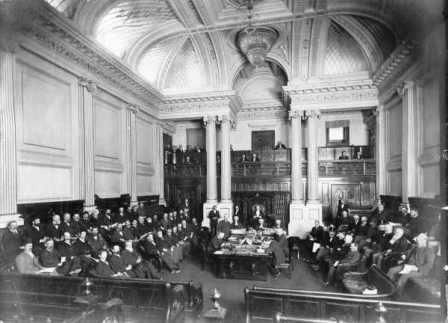
Legislative Assembly 1896 State Library of Victoria cc000498
This chapter shows the continuing struggle in the years up to when women won the vote in Victoria. First, we start with a sample of suffrage organisations |
Women attracted reaction Legislative attempts |
1...HAD THERE BEEN WOMEN IN THE HOUSE ...
Alice Henry: 'Women ask for the vote because ... they see their poorer sisters sweated, starved ... deprived not only of the pleasures, but the bare necessities of existence', wrote one prominent suffragist, 'and they ask for a vote for women in order that these neglected children of the State may have ... the protection that a vote affords.'
p 41 Alice Henry: The Power of Pen and Voice CUB 1991
Leslie M Henderson: 'She (Vida Goldstein) now began to attend meetings of the Victoria Parliament, spending many hours in the galleries of either House whenever any measure affecting women or children was being debated ... in an article she wrote in 1903 entitled "Should Women Enter Parliament?" in which she argued that "through not having women in Parliament the energy and valuable time of individual women and women's organisations have to be spent on the often Herculean task of educating members up to the point of seeing the injustices in certain measures affecting women, eg, the Federal Public Service Act. It bristled with discrepancies in pay for men and women doing exactly the same work.To get the principle of equal pay embodied in the Bill some of us had to spend days at the House lobbying members - always hateful work - showing them the many injustices in the Bill from the women's point of view, and trying to get them to see them as we saw them. We had to tramp round getting petitions signed and write to the press.
Had there been women in the House there would have been no need for such tactics because the injustices were so obvious that they only had to be pointed out, and most members promised to get them removed. The Naturalisation Bill was another instance: it completely merged the individuality of the married woman with that of her husband." (Years later Vida told me that within a year or so of the passing of the Public Service Act the equal pay provision was quietly removed from it with hardly a murmur of protest from women.) Leslie M Henderson The Goldstein Story Stockland Press Melbourne 1973
2...THE VICTORIAN WOMEN'S SUFFRAGE SOCIETY (1884 - 1908)Diane Kirby: ' ... (There was) an increasingly vociferous demand for reforms in the 1890's and women now had an organizational basis from which to agitate. Australian women's rights activists demanded not only enfranchisement and legislative reform in Married Women's Property Acts and Guardianship of Infants Acts, but also dress reforms and increased physical recreation. They urged increased participation of women in the trades, the professions, and white-collar occupations; the establishment of women's hospitals; and women factory women inspectors. The Victorian Women's Suffrage Society, for example, desired to obtain for women the same political privileges as men enjoyed, but it also demanded equal justice, equal privileges in marriage and divorce, woman's right to her own property and children, and the rights of women to work.' p 40 Diane Kirby Alice Henry: The Power of Pen and Voice CUB 1991
3...THE WOMEN'S CHRISTIAN TEMPERANCE UNION 1888Diane Kirby: 'The Women's Christian Temperance Union sought equal pay, the appointment of female factory inspectors and police matrons, and the election of women to school boards. It encouraged young women's independence and opposed the double standard of morality by attacking age-of-consent laws and contagious diseases acts.' p 41 Alice Henry: The Power of Pen and Voice CUB 1991
More generally, Muriel Heagney in her notes described how -
Muriel Heagney: 'In 1891 Victorian feminists were stimulated by the return from England of Miss Annette Bear (afterwards Bear-Crawford), who believed there was no hope of checking social evils while women were voteless and helpless to make public their grievances and wrongs. Other returned travellers included Dr Constance Stone, the first doctor to practice here, Mrs Caroline Landale, Miss Elphinstone Dick and Miss Alice Moon - pioneers in the physical education of girls. In association with Mrs Isabella Goldstein and her daughter, Vida, Miss Bear formed a vigilance association to watch over the interests of women and girls ... Meanwhile progress made in admission to universities gained, women doctors began to practice, giving particular attention to underprivileged women and children.The Queen's Jubilee Celebration in Victoria was made the occasion to appeal for funds for women throughout Victoria to establish a women's hospital staffed by women doctors ... Miss Bear suggested the idea to a small group - Dr C Stone, Mrs I Goldstein, Vida and H H Champion, in Mrs Goldstein's home. The main objective was always the Parliamentary vote.' Muriel Heagney papers State Library of Victoria
In 1894 Annette Bear-Crawford founded the United Council of Women's suffrage.
4...THE UNITED COUNCIL FOR WOMAN SUFFRAGE 1894Marilyn Lake: 'Frustrated at their lack of progress, suffragists decided to regroup, forming the United Council for Woman Suffrage in 1894 to co-ordinate the activities of the many interested associations, of which there were thirty-two, including the Victorian Lady Teachers' Association, the Central Methodist Mission and the Trades Hall Council. The activism of Clara and Alice Weekes in the Victorian Lady Teachers' Association, which had been formed in 1884 in support of equal pay and opportunities for women teachers, was influential in linking feminism with industrial issues in ways not so apparent in campaigns in other colonies.' p 43 Getting Equal The History of Australian Feminism Allen & Unwin 1999
Muriel Heagney: 'The Council directed policy, published literature, circularised members of Parliament and candidates, held meetings - public and private - and pursued a house-to-house canvas in every district that could be reached. These were largely acted on by local Progressive Leagues, because the Council encouraged discussion on any questions touching on social and civic welfare of home and family.' State Library of Victoria
"Monster Demonstration - Melbourne Town Hall - 1,000 people attended!"
"The United Council organised a deputation and more than 300 women crowded into Queens Hall in the Parliament Building." See Chapter 1 200 Women in the House
'A Daughter': 'We believe in what we call representative government. This has been defined as the governing of the people by the people. But have we not, rather, the government of the people by half the people?' 'A Daughter' The Court Dec 1895
5...WOMEN'S PROGRESSIVE LEAGUE 1900Yvonne Smith: 'Women's Progressive League - its aims were: to secure for women civil and political rights equal to those of men; the general emancipation and advancement of women; the right for women to enter architectural courses and proposed State Agricultural Colleges. General reforms included prison and factory legislation, health, and the establishment of Children's Courts.They ran discussion courses on cookery, literature and health, and also conducted house to house canvassing, deputations, petitioning and public meetings and also established suffrage literature. The League was a branch of the United Council for Woman Suffrage but independent of it. By December there were 32 societies making up the League. There were strong connections with the labour movement and the socialists.' Taking Time - A Woman's Historical Data Kit ed Yvonne Smith, Union of Australian Women (See Chapter 3:6)
Muriel Heagney: 'The organ of the Council (United Council for Women's Suffrage) was the "Woman's Sphere", an interesting monthly carrying world news edited by Vida Goldstein.' State Library of Victoria
Women's Sphere: 1900 SUFFRAGE DEMONSTRATION
'The Women's Suffrage meeting at the (Melbourne) Town Hall on September 17th was a great success. At a quarter past seven the crowd waiting for the doors to open stretched out to the roadway. There were over 2,000 people present. Our opponents say it is only a noisy minority who want the suffrage.A noisy minority would find it difficult to pack the Town Hall with such an enthusiastic and representative audience as rolled up on that occasion. If they are in the majority, why don't they hold a public meeting?' p 11 of the October 1900 Women's Sphere
7...NATIONAL COUNCIL OF WOMEN 1901
Yvonne Smith: 'Victorian National Council of Women formed 22 November. Its aim was to form a link between various societies so that they had an arena for co-operation on specific objectives, these being children's courts and playgrounds and a successful campaign for the establishment of police matrons. They reported on the conditions of women in prisons and participated in a number of deputations urging that woman suffrage be made a government measure. It had an all-woman executive and 28 affiliated in 1902 then 32 affiliates in 1904.' The four original affiliates were: The Australian Salon of Music, Literature and the Arts, Jewish Women's Guild, Young Women's Christian Association and the Women's Christian Temperance Association.' Taking Time - A Woman's Historical Data Kit ed Yvonne Smith published Union of Australian Women
Audrey Oldfield: 'In October 1906 the apolitical Victorian branch of the National Council of Women, which now represented thirty-four women's organisations in the state (some of them suffrage groups) ... decided to enter the suffrage fray.'
8...THE WOMEN'S FEDERATION 1902Alice Henry: 'A great demonstration' took place in the Melbourne Town Hall on June 18, 1902, to celebrate the conferring of the Federal vote upon the women of the Commonwealth, and to affirm the desirability of their early enfranchisement for the State of Victoria.' Marching Towards Citizenship Centenary Gift Book SLV
Yvonne Smith: 'The Women's Federation was formed 26 November. Its aims were: to organise women politically around all questions of social reform and matters affecting women in the home and at work; public lavatories for women; Infant Life Protection Act amendments. They also took on charity projects. There were strong connections with the labour movement.' Taking Time - A Woman's Historical Data Kit ed Yvonne Smith published Union of Australian Women
Muriel Heagney: 'The International Conference of Women - In 1902 Australian women were represented at the conference of the newly formed International Conference of Women. Miss Goldstein represented Australia and New Zealand." State Library of Victoria
9...MELBOURNE WOMEN'S POLITICAL ASSOCIATION (WPA) 1903 was formed in March.
(See Appendix 1 Papers for the WPA platform ... See Appendix 1 Papers for the WPA objects)
Yvonne Smith: ' Its aim was to educate and to organise women to use the vote in federal elections ... to pursue interests of home, children, sound economy in state and federal governments, and to improve social and industrial conditions. The WPA ran a vigorous campaign for state suffrage in Victoria. It ran mock elections and parliaments to educate women politically ... Its political work included petitions for federal marriage and divorce law reform, deputations and test questions to parliamentary candidates.The association also worked for Vida Goldstein's campaign as an independent candidate. Vida Goldstein became the first woman in the British Empire to stand for parliamentary election. This was the first federal election in which women were eligible to vote and become a candidate in Australia and Vida received 50,000 votes in a state wide contest in which the highest vote was 110,000.' Taking Time - A Woman's Historical Data Kit ed Yvonne Smith published Union of Australian Women
Woman's Sphere: "We make a final appeal on the eve of the election to the women of Victoria for unity of action. On this great occasion, which we know is exciting keen attention throughout the English speaking worlds, when for the first time in history the women of a nation have an equal voice with the men in selecting the governing body, we would ask the women to drop minor differences, and cast a united vote on the side of progress and reform ... Let them exercise their own judgement and boldly follow it. Let them, above all, sink all personal prejudices, all sectional jealousies, and all little matter that cannot affect the broad policy of a government.
They have a chance of showing their disinterestedness, their superiority to pique, and their real devotion to the causes which thinking women have at heart ... If they would witness the triumph of the cause of women, and feel that they, too, had had a share in that triumph, they should record one of their four votes for the Senate in favour of the woman candidate. If they will do this with some degree of unity, the triumph is assured, and they will hereafter be proud that they had a share in it." 5 Dec 1903 Close Up the Ranks" p.280 from Uphill all the Way Kay Daniels and Mary Murnane UQ Press 1980
Muriel Heagney: '9 July 1903 Miss Rose Scott & Miss Vida Goldstein were invited to speak by the Reform League at their meeting for women voters. They refused because they had no sympathy with the conservative leaguers.' State Library of Victoria
Women's Sphere: "Grand Suffrage demonstration, Melbourne Town Hall February 1903"
10..WOMEN'S SUFFRAGE DECLARATION COMMITTEE 1906Audrey Oldfield: 'In 1906 the Age gave good coverage to the British women's suffrage struggle (which was just entering its militant phase) and one of the items featured was that individual women were being asked to sign 'declarations' to say that they believed women should have the vote. In 1907 the Victorian women took up the idea. Thirty-six women from eighteen societies "specially interested in securing women's suffrage" met at the Women's Christian Temperance Union offices, with Goldstein presiding.
The meeting decided to form a Woman Suffrage Declaration Committee which would issue forms on which men and women would declare their support. The forms were to be held by the committee and presented to Parliament at an appropriate time. ... Under the Presidency of Eleanor Hobbs, also Superintendent of the State Suffrage Department of the WCTU, and with Eugenie Davidson as its Secretary, the Declaration Committee earned its name on a collective level by its continued reiteration of the women's claims, especially in the lead-up to the Victorian elections in 1907 ...
Two results of the 1907 election were significant for the rest of the suffrage campaign: Labor was crushingly defeated, and the number of Liberals in the Assembly who were committed to woman suffrage increased. In May 1908 Bent attended a gathering of Premiers of all Australian states. A motion came before them that the electoral laws of the states should be made uniform with those of the Commonwealth. Bent maintained that there was no possibility of making the electoral laws uniform while other states retained woman suffrage. Victoria, he said, was not going to do anything so 'foolish' as to give its women votes.
The Women's Suffrage Declaration Committee ... reacted immediately by calling on Bent to resign because of his arrogant assumption "that because he is opposed to woman suffrage, therefore the whole State is opposed to it".
"The Committee begs to remind the Premier (Bent) that the State has declared in favour of woman suffrage by overwhelming majorities at six general elections, that the Legislative Assembly has passed the woman suffrage Bill thirteen times in thirteen years, that now only two voices are required to pass it in the Legislative Council, and that five members of his own Cabinet are in favour." pp 159 Audrey Oldfield Woman Suffrage in Australia A Gift or a Struggle? CUB 1992
11..MORE LOBBYING OF PARLIAMENT
Alice Henry: 'The main objective, always the Parliamentary vote, would certainly have been attained long before had it not been for the Upper House. Argument was wasted on the members, and yet arguments were not wanting. (The suffragist) Annie Lister, afterwards Mrs Lister Watson, presented opponents with a formidable list of women's disabilities.
As a mother, she had no right to the care and control of her children, the father being sole legal guardian. The grounds for divorce were not the same. Solicitation on the street by a man was not punishable. A girl could be arrested for it, and brought to court, to be judged by the very class of men who will defend prostitution as a social institution, maintained in existence for the convenience of men. Mrs Evelyn Gough's Non-Represented Female Labour summed up the glaring inequalities in both remuneration and position among the thousands of men and women who were State servants, teachers, post and telegraph employees, and employees of all ranks in asylums and gaols. "The State," she urged, "exacts qualifications and ability without partiality." Not so in the matter of remuneration and standing.' Marching Towards Citizenship in the Centenary Gift Book ed Frances Fraser and Nettie Palmer, pub The Women's Centenary Council Robertson & Mullens Ltd Melbourne 1934
Collins Street Melbourne 1907 State Libraary of Victoria sj00015412..REACTIONARY WOMEN'S GROUPS
The Australian Women's National League did not support the Women's Movement -
Audrey Oldfield: 'Not all the women's organisations were joining in the campaign against Bent; even at this stage the Women's National League was maintaining "the strictest silence". On 8 July, Goldstein wrote to Mrs Shepparton of the league asking how the organisation dared to call itself national - and claim it was working in the interests of women and children - when it declined to speak up for the state vote. An article in the Advertiser commented that it was "strange that members of the Australian Women's National League can take such an enthusiastic interest in the Federal franchise and yet content themselves with having no vote in the State Parliament". 160 Audrey Oldfield Woman Suffrage in Australia A Gift or a Struggle? CUB 1992The AWNL magazine, THE WOMAN, doesn't mention suffrage or the State Parliament in 1908 as far as I can see, simply addressing socialism and Federal Parliament.
THE WOMAN, Mrs L J Darlot: 'The Case Against Socialism "It cannot be productive of good, inasmuch as it is not, and never can be, suitable to the aspirations of mankind. It may, and is likely to be, an agent for harm, in unsettling the minds of the ignorant by visionary ideas of universal plenty and equality." Aug 28 1908 State Library of Victoria
THE WOMAN:: 'It may be taken for granted that no woman whose eyes are opened to the meaning of the socialist programme will support it ... Women can have no better task than that of placing their sister woman upon the electoral roll, and warning them against the arts that will be practiced by the agitators who live by promoting class animosities, and thus paving their own way to Parliament and to well paid billets. Women are the natural enemies of these schemes, because every woman looks forward to the elevation of her family and the preservation of her home. She desires the advancement of those near and dear to her for their own sakes; and in promoting it she really works for the benefit of her country.' State LIbrary of Victoria
THE WOMAN: 'Australian Women's National League Annual Demonstration and Welcome to the delegates to the Commonwealth Conference of Women's Anti-Socialistic Organisations Town Hall Friday 25 Oct 1907 8pm The President, Janet Lady Clarke in the Chair.' State LIbrary of Victoria
13..BENT'S CONTINUED OPPOSITIONMuriel Heagney: 'The last stage of winning the vote proved more difficult. Conservative opposition was as stubborn as ever. The women's anti-suffrage petition, for which 23,000 signatures were gathered, was collected by Miss Carrie Reid and Miss Freda Durham leading the way. Premier Sir J Bent was a stumbling block and the Women's Political Association determined to concentrate on him ... Their attentions were truly embarrassing (to him). He went to England. The Women's Political Association were the last words he heard as he left and the same awaited him on his return. The Men's League for Women's Suffrage was formed.' Muriel Heagney notes State Library of Victoria
14..THE MEN'S LEAGUE FOR WOMEN'S SUFFRAGEAudrey Oldfield: 'On 30 June a group of male suffragists called on Goldstein, and offered their help in forcing Bent to introduce a Government measure. Goldstein wrote that they urged the women to 'demonstrate along the lines of the militant suffragists in England'. The deliberations resulted in a decision to form a Men's League for Woman Suffrage, which was constituted within one week.' p 161 Audrey Oldfield Woman Suffrage in Australia A Gift or a Struggle? CUB 1992
Vida Goldstein: 'From ... (1898) until 1908 when the great victory was won, a Woman Suffrage Bill was a hardy annual in the Legislative Assembly. Time after time, year after year, the Bill was ruthlessly rejected by the undemocratic Legislative Council, in spite of all the evidence the country gave in its favour at General Elections and in other ways. Indeed, we might have been without the vote yet, had it not been for the sense of chivalry and justice of our own men supporters, who, in 1908, formed the Men's League for Woman Suffrage, and reduced the Legislative Council to political ashes. Towards the end of that year the long siege of the Council ended. Having gone round this modern Jericho seventeen times, its walls and opposition speeches fell flat before the forces of democracy, and the women of Victoria received the State franchise.
It seems invidious to mention names, but I feel that when speaking of the Men's League for Woman Suffrage, two of the very good friends who came to our assistance in those dark days should be mentioned by name, the Rev Dr Charles Strong and Dr Maloney, MP, because they had been in the forefront of the struggle for Woman Suffrage from the beginning, Dr Maloney having introduced the first Bill in the Assembly in 1889.' The Struggle for Woman Suffrage - summary of the Suffrage Movement in Victoria' presented to the WCTU Melbourne 1947 p116 in Isabel McCorkindale ed Pioneer Pathways Sixty Years of Citizenship 1887-1947 Morris and Walker 1948.
15..KEEPING UP THE PRESSUREAudrey Oldfield: 'As Bent still procrastinated, the National Council of Women sent another delegation ... (There was) pressure from the apolitical National Council of Women ... to acknowledge 'the accomplished fact' of woman suffrage in the rest of Australia ...
In the month when the Bill was waiting to go to the Upper House, Goldstein wrote sixty-one letters to members of Parliament on its behalf, and the women submitted 21,000 "declarations" which the Declaration Committee had been gathering since early 1907. Councillor Thomas Harwood announced that he would present a petition against the woman's vote which he was sure would have 40,000 to 50,000 names. Three weeks later he produced 1,207. Goldstein scoffingly called his document a "Declaration of Dependence" ... ... Not the least may have been the fear that the Victorian 'good fighters' might metamorphose overnight into dreaded suffragettes, and so bring condemnation on Victoria from the rest of Australia.' p 161-162 Audrey Oldfield Woman Suffrage in Australia A Gift or a Struggle? CUB 1992
There is another possibility. A new party had been formed - the United Liberal Party in 1907 and the Liberal Party in 1908. The men in Parliament who so opposed women's suffrage now were in a Party, rather than being part of various factions, so they would have compared notes on many current issues that they didn't before, and considering the fact they were married and presumably valued their home lives, couldn't Lysistrata's revenge been a factor? Whatever the reasons were, they succeeded!
This was in the Union of Australian Women's Newsletter, May 1984 -
1889 Woman's Suffrage Bill (Dr Maloney) ... Discharged from notice paper.
1894 Woman's Suffrage Bill (Dr Maloney) ... Bill lapsed.
1895-6 Plural Voting Abolition and Woman's Suffrage Bill (Mr G Turner) ... not returned from the Legislative Council.
1898 Woman's Suffrage Bill (Sir George Turner) ... not returned from the Legislative Council.
1899-1900 (1) Woman's Suffrage Bill (Mr McLean) (2) Woman's Suffrage referendum Bill; (3) Woman's Suffrage Bill (Mr H R Williams) ... not returned from the Legislative Council.1901 Woman's Suffrage Bill ... discharged from the notice paper.
1902 Constitutional Reform Bill section 25 - 'Women may vote at Assembly elections' ... this section rejected by the Legislative Council.
1903 31 March, Dr Maloney moved that the following words be added to the motion - 'Provided that the clauses relating to Women's Franchise eliminated by the Legislative Council are reinstated' ... Defeated. (1) Woman's Suffrage Bill (No 1) (Dr Maloney) ... Bill elapsed. (2) Woman's Suffrage Bill (No 2) (Mr Mackinnon) ... Bill elapsed.
1904 Woman's Suffrage Bill (Mr Lawson) ... Bill discharged from notice paper. 1905 Adult Suffrage Bill (Legislative Assembly) ... Bill not returned from the Legislative Council.
1905 Adult Suffrage Bill (Legislative Council) ... Bill lapsed.
1906 Adult Suffrage Bill ... Bill not returned from the Legislative Council.
1906 Woman's Suffrage Bill (Mr Watt) ... Bill withdrawn. 1907 Adult Suffrage Bill (Legislative Assembly) (Mr Prendergast) ... Bill not proceeded with.
1908 (1) Adult Suffrage Bill (Mr Prendergast)... Bill discharged from notice paper.' Taking Time - A Woman's Historical Data Kit Yvonne Smith, Union of Australian Women, UAW Newsletter May 1984.Audrey Oldfield comments: 'A speaker at a National League meeting of 8,000 women in July 1908 urged it to support state suffrage for women, because members could use their votes to combat socialism." p 160 Audrey Oldfield Woman Suffrage in Australia A Gift or a Struggle? CUB 1992
Then Bent himself brought it in!
Muriel Heagney: 'Sir J Bent was courageous and good humoured as he rose to move the second reading -
"Since I have been Treasurer", he said, "the good work that women have been doing in connection with charitable institutions had come under my notice. The result of my cogitations on the whole was that it was illogical to deny to women the right she has so clearly demonstrated herself as fit to have with the same responsibility as man". The Bill was sent on to the upper house, where it passed without a division and received Royal Assent on 31 March 1909.' State Library of VictoriaYvonne Smith: '1908 (2) Adult Suffrage Bill (No 1) (Mr Prendergast) ... Bill brought in and the second reading by Sir Thomas Bent, Bill passed both houses.
1909 15 February, His Majesty declared his assent to above Bill.
1909 - 31 March, the Governor of Victoria Proclaimed His Majesty's assent. July 6 message presented to the Legislative Assembly re the Adult Suffrage Bill to be proclaimed in the Victorian Government Gazette on 31/3/1909.' Taking Time - A Woman's Historical Data Kit Yvonne Smith, Union of Australian Women, UAW Newsletter May 1984.
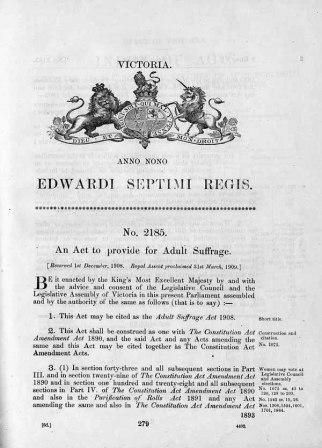
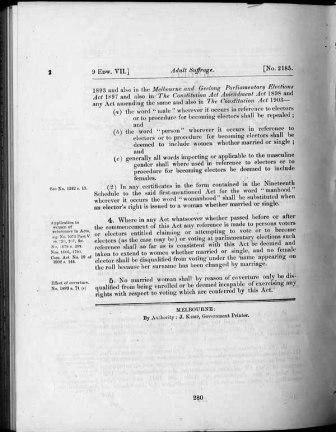
1908 Adult Suffrage Act Public Records Office of Victoria a2185-1909-p279_t a2185-1909-p280_t
This is taken from the Public Records Office website.
No 2185 Adult Suffrage Act: An Act to provide for Adult Suffrage 1909
[Reserved 1st December 1908.
Royal Assent Proclaimed 31st March 1909]Be it enacted by the King's Most Excellent Majesty by and with the advice and consent of the Legislative Council and Legislative Assembly of Victoria in this present Parliament assembled and by the authority of the same as follows:-
1. This Act may be cited as the Adult Suffrage Act 1908 ...This act gave women over 21 years of age the vote. The main clauses of the act were: "In electoral acts the word 'male' was removed and replaced with the word 'persons' to include both men and women, and married women as well as single women would be allowed to vote". Public Records Office of Victoria
The Adult Suffrage Bill passed both houses on 24th November 1908. There was an Assembly election in 1908 at which women were not eligible to vote because the Bill had not received Royal assent, but after that - 31st March 1909 - they could vote!'
31 MARCH 1909 THE VICTORIAN ADULT SUFFRAGE ACT WAS PROCLAIMED
Parliament House Melbourne 1908 State Library of Victoria sj000591Women had won the right to vote in Legislative Assembly elections, and equality with men at elections for the Legislative Council. Aboriginal women were not specifically excluded, but most people believed and acted as if they were and voting was not compulsory for Aboriginal people until 1982. Pat Grimshaw public talk September 2008
Any person in receipt of 'charity' was excluded. That, in fact, was taken to mean Aboriginal people living on reserves.
Patricia Grimshaw: 'The 1908 Adult Suffrage Act did not explicitly debar Vicatorian Aboriginal women from voting, just as the 1855 constitution had not barred Aboriginal men. But, from 1901, Victoria was an integral component of a national political structure, and decisions made at a federal level influenced policies within the state. In this instance, a legal interpretation of the 1901 Commonwealth Constitution protected political rights solely for those Aboriginal men who already had their names on the state electoral roll. This decision put in jeapordy the political rights of Indigenous Victorian men who turned 21 years of age after 1 January 190;1, a debarment that flowed on to Indigenous women despite the apparent inclusiveness of the 1908 Act.' p 198 Victorian Historical Journal, Women's Suffrage Centenary Issue Volume 79 No 2 Nov. 2008
Mrs E Hobbs of the Women's Christian Temperance Society wrote:
'The battle has been fought, and the victory won. The vote for which we have so long prayed is ours. Let us thank God, and pray that He will help us to use it for Him, and the good of this dear land of ours ...' The Signal December 1908 from Pioneer Pathways sixty years of citizenship 1887-1947 ed Isabel McCorkindale WCTU 1948
Audrey Oldfield: 'On 5 December the leading suffragists had their photograph taken in the Botanic Gardens, and two days later they held their victory celebration, which they called a 'Commemoration Conversazione'. It was attended by 'a large enthusiastic audience'. Eleanor Hobbs (the hard-working Superintendent of Suffrage in the WCTU since 1898 and President of the Declaration Committee since its formation) was in the chair, and the meeting gave pride of place to the two early pioneers, Lowe and Dugdale, who reviewed the early days of the struggle.
Lake in Botanical Gardens 1908 State Library of Victoria sj000666Dr Maloney, honoured because he introduced the first bill, was loudly cheered when he told the meeting he hoped they would not rest until the women had the right to sit in Parliament. Mrs McLean, President of the WCTU, thanked the Men's League for its support, and Janet Michie said the women's first aim should now be to gain equal pay for equal work. The last speaker was Goldstein, who read a long honour roll of workers over the years; one hopes Brettena Smyth had a prominent place on the list. No-one, as far as we know, thanked Sir Thomas Bent.
At the victory celebration it was suggested that there should be a memorial to honour the Victorian women who had fought for the vote. Suggestions poured in which Vida recorded in her diary: an obelisk, a bed in the Women's Hospital, a Women's Centre, an annual garden party, a free kindergarten ... The most interesting was that there should be erected a white marble statue of an upright Goldstein, with her foot on the neck of a prostrate black marble statue of Thomas Bent. I have been unable to uncover any evidence of a memorial.' p 163 Woman Suffrage in Australia
We didn't get the statue of Vida with her foot on Sir Thomas Bent a one feminist imagined but, we have a memorial. What we have is this small plaque in the Parliament House Gardens, Spring Street Melbourne, with restricted access, commemorating Vida: We understand the League of Women Voters has access once a year for a couple of hours, to show it to women.
http://www.whitehat.com.au/Australia/People/Goldstein.asp
Vida Goldstein Plaque
in Parliament House GardensThe suffragists must be turning in their graves because we do have a commemorative statue and pedestal in a prominent position on the Princes Highway, Brighton for everyone to see, at any time they choose. But it commemorates one of their main enemies - Sir Thomas Bent! Sculpted in bronze on a pedestal of granite by Margaret Baskerville, this was paid for by public subscription.
Margaret Baskerville sculpting statue of Sir Thomas Bent
Statue Nepean Highway Picture Victoria courtesy of the Bayside Library Service20..STANDING FOR PARLIAMENT
Although women could vote in the Victorian Parliament it was not until 1923 that the Bill allowing women to stand for Parliament in Victoria was passed, and 1924 when it was proclaimed.
1924 12 May ... Royal Assent notified by Proclamation.
Parliamentary Elections (Women Candidates Act):
1923 13 December ... Passed Parliament.
1923 22 December ... Reserved for Royal Assent.Alice Henry: "Women you have full citizenship. Use it to the full."
In chapter 6, 'Moving into the Public World', we look at some of the things the women did when they had the vote.
